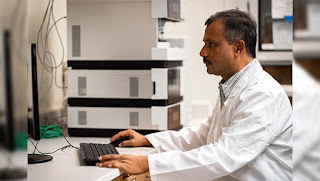Fenugreek as a growth promoter in broiler diet

This study was carried out to evaluate the efficacy of Fenugreek seeds ( Trigonella foenum-graecum L.) on overall performance of broiler. A total of 96-day old Cobb-500 chicks were randomly divided into four dietary treatment groups namely T0, T1, T2 and T3 having three replications in each treatment group. Brooded chicks were randomly separated into replications wise separate pen to rear up to 4 weeks. Each treatment group contains 24 birds (8 birds in each replication). Experimental birds in T1, T2 and T3 were provided fenugreek seeds meal with 0.5%, 1% and 1.5% of feed while T0 was provided with standard feed and considered as control group. The results of this study were indicated that final live weight gain and feed efficiency of birds was significantly (P<0.05) higher in T3 compared to T2, and T0 respectively. The result also indicated that feed efficiency was increased at dose rate of 1.5% fenugreek seeds meal in T3 compared to T2, T1 and control T0 group respectively. In ca...
